The past year has been one of unrelenting extreme weather disasters, with severe economic and health impacts on communities in Australia and worldwide. The ongoing effects of COVID-19, over-reliance on fossil fuels and Russia’s invasion of Ukraine have seen food and energy prices climbing to record highs, and climate disasters are fuelling devastating disruptions due to historic levels of rain, drought, heat, fires and storms across the world. These recent events underscore the need for transformative action.
The latest science has made abundantly clear that global emissions need to plummet this decade. Avoiding climate catastrophe depends on every country bringing the most ambitious commitments and actions they can muster to the table and COP27 is a chance for world leaders to check in and increase momentum.
We’ve got eyes and ears on the ground and will be bringing you everything you need to know about this critical event. So strap in and stay up to date with our running blog.
Thursday Nov 17
We are all acutely aware of how rapidly the clock is ticking down here on Day 9 at COP27, and how far away from consensus participating countries appear to be on many aspects of the final text, which is technically due tomorrow. However, it seems just like COPs in the past, this one will also run a day or two over. We know there is agreement on wording for the Santiago Network (which deals with technical support for Loss and Damage), and possibly acknowledgement of Human Rights and Indigenous peoples.
These are welcome steps. But the critical issues of greater ambition on mitigation and climate finance, especially for loss and damage, remain blocked at this time. Many climate-affected nations would now be happy to see Loss and Damage just appear in the text, without any concrete details. This so-called implementation COP is yet to deliver on meaningful action, but we are told that something will be cobbled together over the next 36 hours.
Amidst the side events and conversations, we also met with Senator Jenny McAllister, Assistant Minister for Climate Change and Energy, as part of a Climate Action Network Australia briefing. The Climate Council raised the critical issues of Australia’s on-going support and funding of fossil fuels. We also spoke about Australia’s attitude to loss and damage, the devastating impacts of mining and climate change on First Nations’ communities in the Northern Territory and the Australia-Pacific relationship in the context of climate change. Senator McAllister acknowledged these points but said it was important for the government to ensure all decisions were “democratised”. They had a mandate for 43% and were proud of the inroads made into renewables, transport and the Safeguard Mechanism. The Government is also looking forward to COP31 and a greater inclusion of civil society in these processes.
On a final note, the COP Pavilions close down tonight. In Australia’s, a total of 6,888 coffees were served – thank you to the baristas!
We now await the final negotiations, nervous but hopeful.
Wednesday Nov 16
We are coming to the pointy end of COP27 and there is expectation and frustration building in equal measure over what might be delivered.
Minister Bowen indicated yesterday evening that a number of countries, including Australia, were having to work hard to keep 1.5°C on the table, as well as commitments around renewable energy.
We’ve heard from voices at various forums across what is known as the Blue Zone, and there are two messages that keep repeating. The first is that we need to do more and we need to do it urgently, because climate change is already having devastating impacts around the world (and in Australia). The second is that decades of inaction have left us well behind where we need to be in terms of decarbonisation, financial feasibility, as well as policy. This so-called “implementation COP” feels like anything but today and we’ll need to see huge progress over the coming days.
The Egyptian COP Presidency has now appointed a number of Ministers to help progress agreements. This includes our own Minister Bowen, together with his Indian counterpart, on adaptation finance. Let’s hope they can muster the troops before the eleventh hour.
In the afternoon, the Climate Council hosted a panel session at the Australian pavilion this afternoon, under the heading “Building Resilience in the Face of Climate change: Working together as an Australia-Pacific Community”.
The session was opened with a powerful message from Emergency Leaders for Climate Action head, Greg Mullins, who said “Climate disasters have broken records on every continent this year and our future, without strong action, looks bleak.”
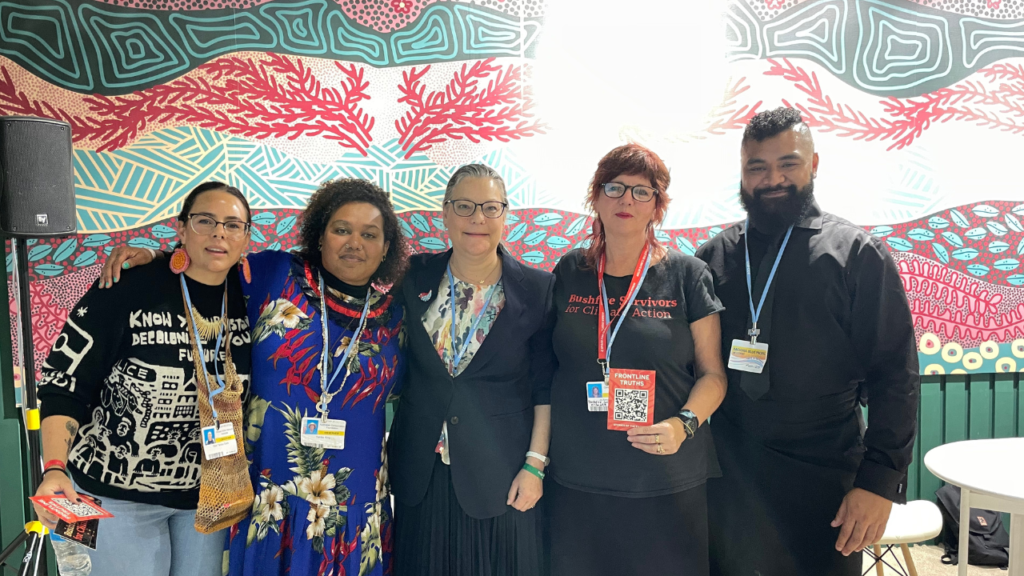
We then heard from Gudanji Traditional Owner, Rikki Dank and Jo Dodds, President of Bushfire Survivors for Climate action, who have been deeply affected by climate inaction and the failure to put an end to fossil fuels. Their powerful stories underpin the urgency of Australia going further and faster. Even as we welcome the initial moves forward from the Albanese Government on renewables, we know its ongoing approval of new fossil fuel developments must be stopped now.
Joe Sikulu, the Pacific Regional Managing Director at 350.org brought home the plight of our Pacific neighbours and shared what genuine cooperation might look like, particularly in light of Australia’s bid to co-host COP31 in 2026. Joe urged Australia and other Governments to make finance available, including desperately needed loss and damage funds.
Climate Councillor Nicki Hutley discussed the importance of public finance to support decarbonisation and adaptation, noting that the private sector can’t always drive progress. She also noted that governments too often ignored the economic evidence around the costs of failing to act on climate change.
Overall, the Climate Council’s panel echoed the messages heard around COP27. Urgent action is needed and there are many things we can do to drive more rapid progress if we can find the political will. High on the list of everyone’s priorities was an end to fossil fuels.
Tuesday Nov 15
We are now well into the second week of negotiations and Australia’s Minister for Climate Change and Energy, Chris Bowen had the opportunity to speak twice at COP27.
Bowen’s first appearance was as one of a large number of panelists in an event hosted by the UK under the title “Accelerating the clean energy transition”, where countries and organisations such as the Global Solar Alliance and International Labour Organisation presented a brief summary of where they had seen progress since COP26.
A passionate opening address from climate justice activist, Vanessa Nakate, set out the urgency of transitioning to Net Zero. She noted that the cost of the Pakistan floods was now put at $40 billion and that the World Economic Forum estimated annual losses from climate change would reach $2.3 trillion per annum by as soon as 2030. Ms Nakate also reminded us of UN President Guterres’ warning that new investment in fossil fuels is “moral and economic madness.”
Waiting for Minister @Bowenchris‘s address at the UK COP Presidency Event at #COP27, and climate activist and inspiring young woman @vanessa_vash just gave an incredibly powerful speech, urging leaders to act NOW. Sadly, Bowen wasn’t there to hear it. #AusPol pic.twitter.com/I8QOYse0SO
— Climate Council (@climatecouncil) November 15, 2022
Many other speakers, particularly those from developing economies, echoed these sentiments and called on developed economies to provide greater financial support.
The International Energy Agency provided some hope, suggesting the recent increase in coal generation investment on the back of the Russian invasion of Ukraine would be temporary. The IEA confirmed that previously announced plans to scale up clean energy manufacturing projects over the next seven years to 2030 would be supportive of the transition to Net Zero.
Minister Bowen’s comments were centred on the theme of “no transition without transmission”. He noted Australia’s commitment to 82% renewables by 2030 but also sought to take credit for the work of Sun Cable. There was, unfortunately, no mention of Australia’s on-going expansion of fossil fuel developments. It seems that many COP27 delegates are overly anxious to be polite, rather than pressing their colleagues hard on actual performance.
A couple of hours later, Minister Bowen took to the Plenary Stage to deliver Australia’s National Statement. He acknowledged the terrible toll of climate change, including on Torres Strait Islanders, and the need to keep 1.5 degrees alive. He reiterated Australia’s goal to be a renewable energy superpower and the commitment of $900 million to a Pacific Climate Fund (announced in the Budget last month).
These words, however, are empty rhetoric when unaccompanied by meaningful policy announcements, notably in the areas of fossil fuel reduction and broader developing economy finance. This is no time to pat ourselves on the back for rejoining the Net Zero Race – we must instead move faster and harder to support the global transition.
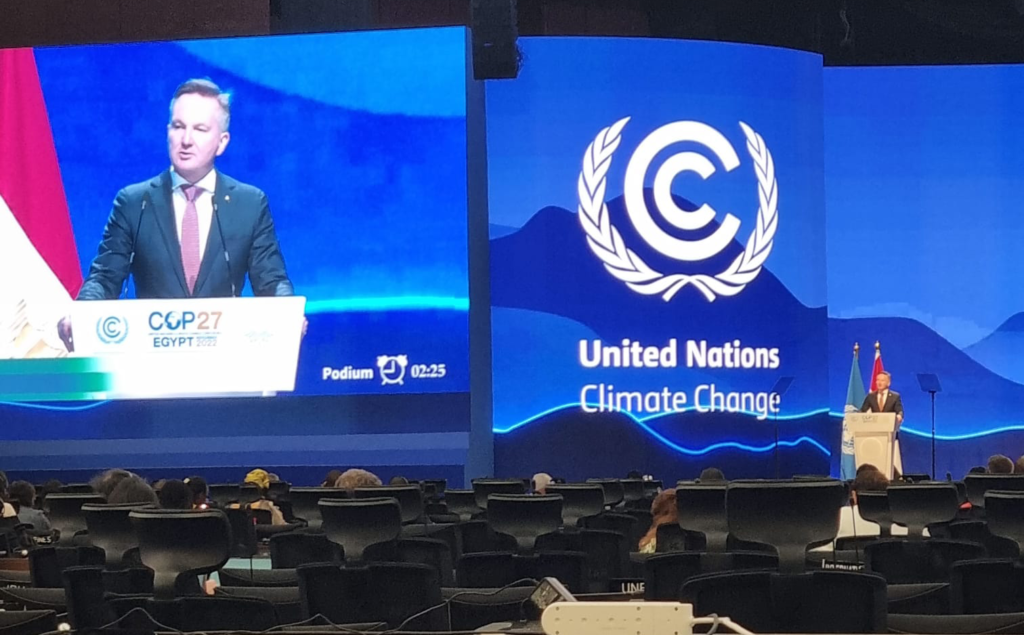
Monday Nov 14
Australia was given a harsh reminder at COP27 today that it still has an enormous amount of work to do on climate action, despite a big shift in the Federal Government’s focus since the May federal election.
The Climate Change Performance Index (CCPI), which has been published annually for almost two decades by Germanwatch, NewClimate Institute and Climate Action Network International, was released at the CPO and showed Australia has gone from 59th to 55th place, remaining among a group of countries ranked “very low”.
The index assesses 59 countries and the European Union, which are collectively responsible for more than 90 percent of global emissions.
While the Australian Government has put in place important new policies and initiatives for transforming our energy system, it is early days. The report’s authors said Australia needed to see the implementation of policies before it could shift its ranking significantly.
Key reasons for Australia’s poor performance include:
- Australia’s new 2030 emissions reduction target remains one of the weakest in the developed world.
- We are yet to start phasing out coal and gas production, or even stop publicly funding it.
- Australia is falling well short of our fair share of international climate finance, which is a key focus at COP27.
In releasing the report at the COP, the authors also stressed that “We don’t have time for mistakes” – mistakes that include new oil and gas development.
The need for Australia to urgently lift its game on climate action could not be clearer.
Today was Gender Day today at COP27, a day of recognition that women are disproportionately affected by climate change across a range of issues including health and economic well-being.
Women are also “essential actors”, according to a new report from the Women’s Earth and Climate Action Network (WECAN) and must be brought into the centre of policy-making.
It’s crazy to think just 5 of the 27 COP Presidents so far have been women. Women in general tend to be under-represented in policy and investment discussions. If we are to get the best policy outcomes for all of us, women – and other under-represented groups such as First Nations and Culturally and Linguistically Different communities – must be at the heart of decision making.
It is heartening to hear the voices of women being raised and acknowledged at COP27 today, in a wide range of discussions on strategies including empowering women to take advantage of green economic opportunities.
Sunday Nov 13
There are big expectations of Australia for week two of COP27.
The Government has been telling the world it is back and ready to step up and lead. Now it’s time to back up those words with stronger actions. Minister Chis Bowen has touched down in Egypt so we’re looking for him to ramp up Australia’s commitments after what has so far been a slow start to COP27.
The Climate Council has released a half-time assessment of Australia’s performance at the climate conference. So what has Australia announced during the first week, and what’s left to tick off?
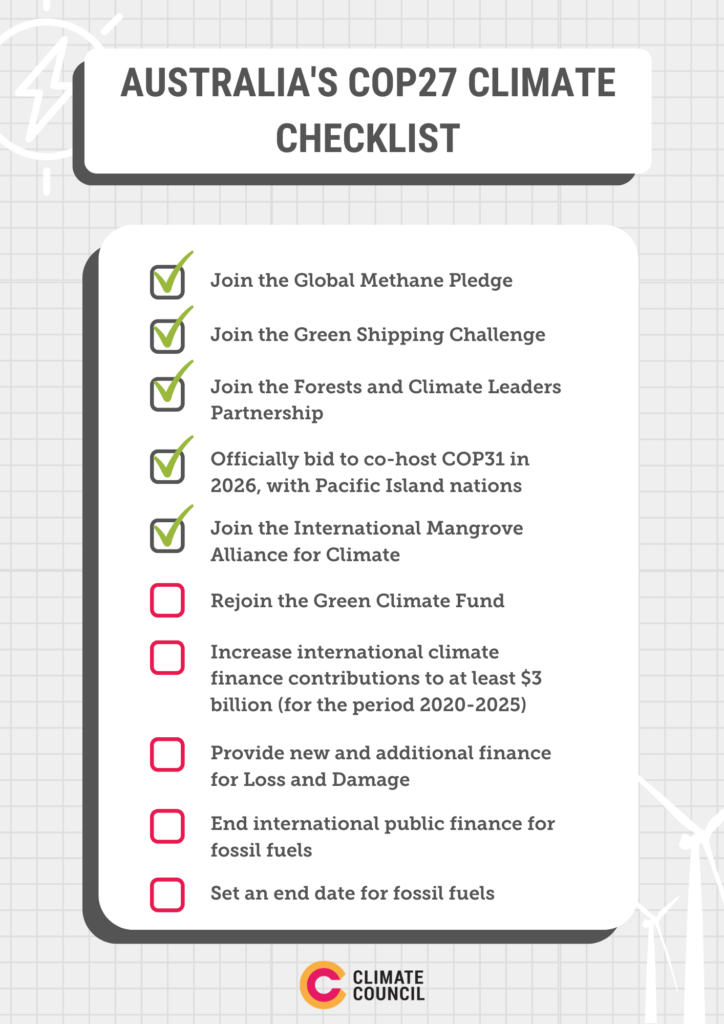
Ministers Bowen and McAllister are urged not to leave Egypt without making new commitments to accelerate Australia’s move beyond coal and gas, and to increase support for vulnerable communities in our region and beyond. The impacts of climate change are being measured in rising hunger and in people being forced from their land and homes. There is no more time to lose.
At a bare minimum, the Government will need to join the US, UK, Germany, New Zealand and dozens of other countries in agreeing to end international public finance for fossil fuels, and will need to fully support the number one priority of Pacific Island countries at this COP – the establishment of a new facility to provide funding to communities facing loss and damage from climate change.
“We saw the US last week at COP27 announce a raft of new strategic initiatives, including a new commitment of international finance for climate change adaptation, new ways to use public finance to unlock billions in private investment, and ensuring major US Government suppliers are required to set Paris-aligned emissions reductions goals. These are good examples of some of the many practical steps the Australian Government can take to start shifting more money towards climate solutions.”
Nicki Hutley, Climate Councillor and leading Australian economist.
Thursday Nov 10
Thursday was human rights day at COP, with a series of creative actions inside the venue to highlight the impacts of climate change on human rights, the need to put human rights at the centre of climate solutions, and the extreme dangers often faced by environmental defenders in many parts of the world. The impacts of climate change are already felt hardest by those who are already marginalised or disadvantaged, who have contributed the least to the problem, and yet whose voices are too often silenced. Put simply, climate change is exacerbating existing injustices and inequities that already exist in the world, and we need to pursue solutions that help correct these wrongs rather than compound them. Many important lessons for us in Australia.
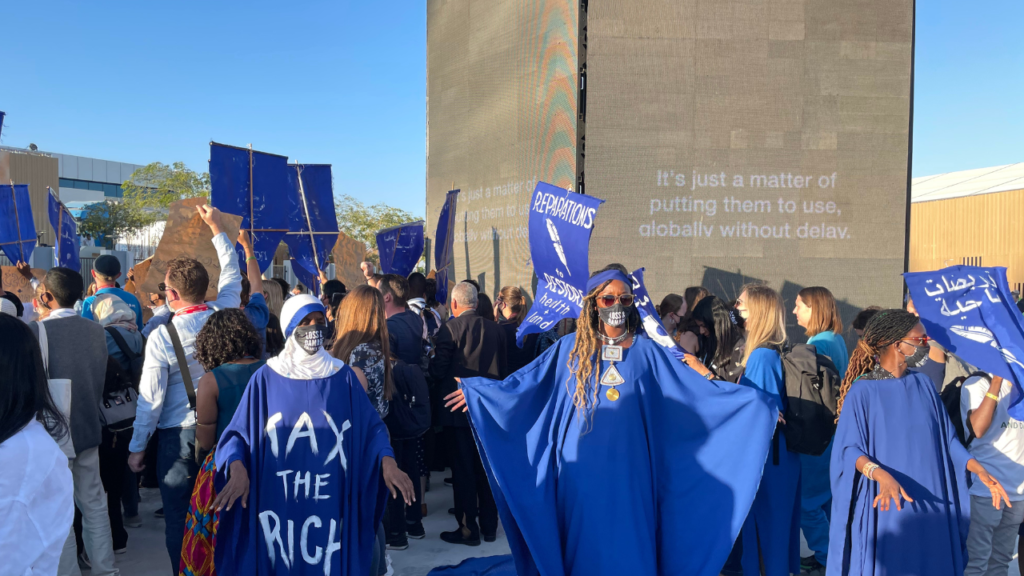
Speaking of creative actions, today the COP venue will be a sea of blue as delegates dress in blue to recognise the immense toll of the 2022’s flooding disasters. It will be a poignant day for many Australians here, many of whom will have been directly impacted by our ongoing east coast flooding disaster. From Lismore to Lahore, it has been a year of unprecedented flooding. Climate change, driven by the burning of coal, oil and gas, means we have an atmosphere that is warmer, wetter and packing more energy for storms. Nothing has driven home the urgency of the climate crisis more than the intense and deadly downpours that befell so many parts of the world in 2022.
Australia has continued with its smattering of small announcements, today joining the International Mangrove Alliance for Climate. Though with Minister Pat Conroy headed home, and Ministers Jenny McAllister and Chris Bowen are not due on ground till the start of week 2, we expect things to be a little quieter on the news front for the next couple of days. Meanwhile, Joe Biden is on his way to Egypt, for a much-anticipated speech on Friday. We’ll be here with the hot takes!
Wednesday Nov 9
Today a few big announcements were made, sending ripples through the conference.
Al Gore launched an essential new climate transparency tool called Climate TRACE.
The platform details greenhouse gas emissions from around the world, providing maps and data on 72,000 power plants, oil refineries, airports and more. It’s clear that this is going to be a very worthwhile tool.
According to the data, emissions from Australia’s dirtiest power station are greater than the combined emissions of all monitored facilities in Kiribati, French Polynesia, New Caledonia, Fiji, Samoa, Micronesia, and the Solomon Islands. In fact, emissions from power generation and fossil fuel operations in Australia are more than the total emissions of all Pacific Island countries combined.
Time and time again, we’re seeing that those that have contributed least to the climate crisis are being hit first and hit hardest. Big emitters like Australia must support those on the front lines if the climate crisis. This has been a major theme of COP27, and will continue to dominate global climate negotiations until real Loss and Damage commitments are made and the world’s biggest polluters start to pay for the damage they have caused.
Speaking of loss and damage, so far it’s a short list of countries who have made new commitments: Canada, Antigua, Scotland, Denmark, Germany, Austria, Ireland, Belgium and New Zealand. This is a good start, but falls far short of where we need to be globally.
If Australia wants to host a Pacific COP in 2026, it must do significantly more to support the region to deal with the impacts of climate change, and join the list of countries leading in this space.
Tuesday Nov 8
We kicked off the day attending the launch event of the Kioa Climate Emergency Declaration at the Pacific Pavilion, a powerful display of collaboration and speaking truth to power.
The declaration calls on governments, including Australia, to work for:
- Greater action on mitigation and an alignment with the 1.5°C temperature goal
- Urgent action on adaptation including financing support for community led-initiatives
- Urgent progress on the issue of Loss and Damage
- The just, dignified and safe movement of peoples in response to climate impacts
- Guaranteed access to equitable climate financing
- Ocean policies compatible with climate goals
- The cancellation of climate debt to ensure inter-generational equity
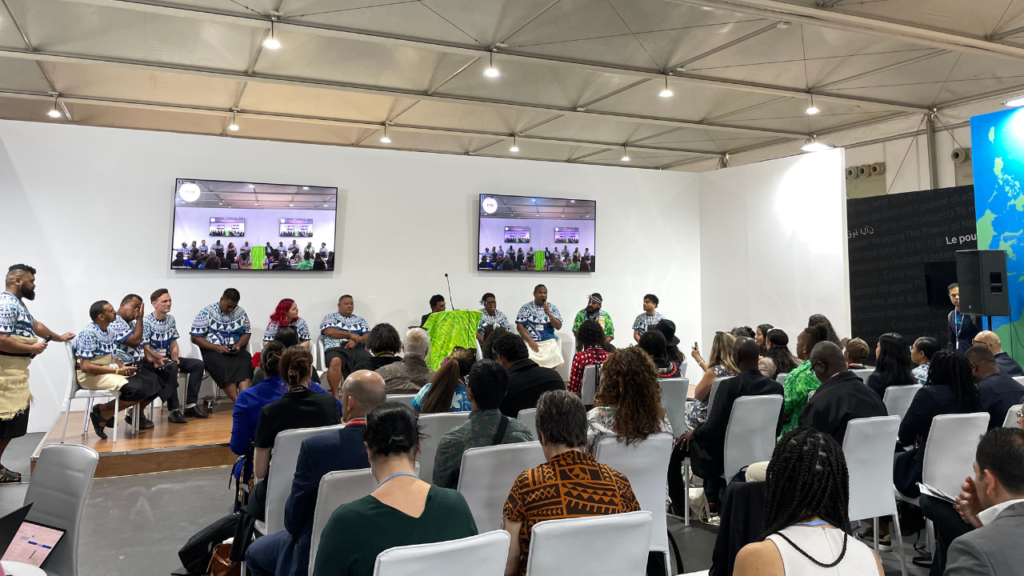
We also heard from a number of inspiring activists and Traditional Owners at the Australian Pavilion including Torres Strait Islanders Tishiko King and Yessie Moseby, Rikki Dank – Gudanji Traditional Owner, and bushfire survivor Jo Dodds. They shared vital perspectives on the climate crisis, and the importance of placing self-determination and human rights at the heart of climate action.
We know we have to move fast this decade. But we know we must avoid the mistakes of the past. The risk of forging ahead with solutions that compound existing injustices, continue to concentrate power in the hands of the few, and run roughshod over the rights and Indigenous peoples, is very real.
The words “not all climate action is climate justice” and “there can be no climate justice without First Nations justice” have been echoing through these halls. To understand what this means, let’s consider a few examples:
When climate solutions are led by local communities and designed to meet their needs, they can be empowering, liberating and work to reduce inequality and disadvantage. Local renewable energy schemes can bring affordable energy to remote communities, freeing them from expensive fossil fuel imports and supporting local livelihoods. Mining the critical minerals needed for the world’s energy transformation can mean new revenue streams for Traditional Owners. Reviving traditional fire management practices can mean good jobs on country and protecting biodiversity.
However, if poorly designed, even well-intentioned efforts to tackle the climate crisis can have negative impacts on communities – often the same communities that are bearing the brunt of climate impacts and have been shattered by colonialism. Large-scale renewable energy initiatives require a lot of land. So do efforts to offset emissions or draw down carbon from the atmosphere. Both carry the risk of land grabs. Similarly, mining – whether for fossil fuels or for the minerals like copper, lithium and cobalt needed for clean energy solutions – have a terrible history in terms of damage to country and benefits flowing to big corporations rather than Traditional Owners.
Yes, we need to move fast this decade, but we need to move together, and in ways that leave communities stronger, healthier and more equal. We cannot solve this crisis with the same approaches and power structures that have caused it. It starts with listening to First Nations voices and ensuring justice, human rights and self-determination are the principles on which we build our clean energy future.
We documented the whole day over on Instagram and Tiktok! Check it out.
Monday Nov 7
The most strident call to action today came from UN Secretary General Antonio Guterres. Gueterres said: “We are on a highway to climate hell with our foot on the accelerator. Humanity has a choice: cooperate or perish.”
“We are on a highway to climate hell with our foot on the accelerator.”
Strong words from @antonioguterres at #COP27 today. It’s time we listen – and act. https://t.co/Wa0W2dBmU5
— Climate Council (@climatecouncil) November 7, 2022
Many developing country leaders used their statements to ram home the message that it’s time for rich countries to pay up: beginning with finally fixing the broken $100bn/year promise. However, it is the provision of additional finance to address loss and damage continues to dominate these talks.
Australia’s announcement that they would like to host COP31 further opens the opportunity to be helping define what real leadership from Australia could look like. Put simply, if Australia’s to lead, we need to get serious about leaving our coal and gas in the ground and supporting the world’s energy transformation.
Sunday Nov 6
It’s go time!
With the formalities taken care of and the agenda for the COP agreed (though not without a last minute fight over whether finance to address loss and damage should be on the agenda), COP27 is now well underway.
Negotiators will now be in their closed meeting rooms, working through highly detailed and technical negotiations across literally dozens of different aspects of implementing the Paris Agreement.
Meanwhile, today sees the start of the World Leaders Summit, with a line-up of around 70 world leaders poised to make their statements. Expect emotions to run high, with some forceful reminders of the year’s brutal climate-fuelled disasters, condemnation of big emitters and the fossil fuel industry, and urgent appeals for more funds to cope with the impacts of climate change and address loss and damage.
First day on the ground!
By Dr Simon Bradshaw – Director of Research
Well, we’re back at COP! It’s been a day of getting oriented, looking out for familiar faces, attending planning sessions with like-minded organizations, and bracing for a fiery first few days.

More than ever, the words “climate justice” and “human rights” are on everyone’s lips.
We are in Africa – a continent where the impacts of climate change are measured in rising hunger and entrenched poverty, where communities have contributed almost nothing to global greenhouse emissions yet are hit first and hardest by the climate crisis, and where promises of funding from developed countries to cope with these realities have time and again been broken. From crippling drought in much of East Africa to deadly floods in Nigeria and South Africa, it’s been a year of unrelenting climate-fuelled disasters.
We’re sitting in a room packed with climate campaigners from around the world, listening to Mohamed Adow, founder of Powershift Africa outline priorities for COP27. On the wall behind are the words “Countdown: 14 days to deliver climate justice”. There is real fighting talk here today, and expect things to kick up another notch or two on Monday, when world leaders start making their national statements. Pakistan is still reeling from one of the world’s worst flooding disasters. In Kenya, as in other parts of East Africa, millions are on the brink of starvation. Expect some impassioned demands for big emitters like Australia – who have built their wealth through fossil fuels – to provide new funding to address loss and damage from climate change.
Final word for today – GAS. We already know how much our fight in Australia now revolves around gas. And being here is a reminder we’re not alone. Gas is clearly the new front of the climate fight across much of the world, including Africa. Any new fossil fuel production is utterly incompatible with tackling the climate crisis – and that includes gas. And yet we can expect COP to be crawling with fossil fuel lobbyists, emboldened by the world’s so-called ‘energy crisis’. In truth, it is not an energy crisis, it is a fossil fuel crisis. And fossil fuels – including gas – are not only disrupting our climate but driving global political instability, deepening inequality and fueling crises in our food systems and our democracies. Put simply, it’s time to kick the polluters out of COP!
Whatever the next two weeks bring, we’ll be here on the ground sharing our insights, carrying your voices with us, and pushing our decision makers as hard as we can. Let’s go!
COP27: Background information
Get up to speed on all you need to know about this COP using the resources below:
> What is COP27 and why is it so important?
> Loss and Damage and climate financing – what it means
> Our latest COP report: Extreme weather records have been broken on every continent on Earth in the 12 months since the last United Nations global climate summit, according to our new report.